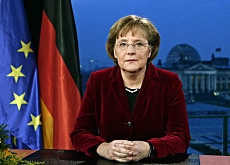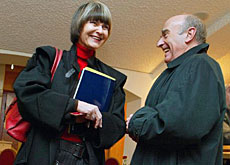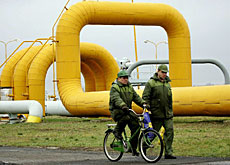Biggest neighbour takes on EU presidency

Switzerland's most important trading partner, Germany, has assumed the presidency of the European Union for the next six months.
Berlin is very well acquainted with Switzerland and the relationship could have an effect on the Swiss-EU bilateral treaties.
But Germany’s traditionally close relationship with Switzerland will not be a theme of its EU presidency. In fact, Switzerland is not to be found in a presidency programme that gives China, Japan and Canada at least a mention.
This seems astonishing considering that Germany is the principal trading partner of Switzerland. But it may just mean that Berlin does not want to get entangled in certain difficulties between Switzerland and the 27-nation bloc.
Had voters blocked the payment of SFr1 billion ($820 million) to new EU members in eastern Europe in November’s referendum, then the Swiss would have appeared in the German programme – as a problem.
Naturally the German EU presidency will concern itself with the current bilateral accords with Switzerland. In response to questions from the media Berlin said it wanted to “further strengthen the close relationship between Switzerland and the EU”.
Expectations
Approval to the so-called Cohesion Fund payments was acknowledged with praise. The German foreign ministry also singled out as a priority negotiations to thrash out a treaty for Switzerland to join the liberalisation of the electricity market, which should begin at the start of this year.
However, Switzerland’s Integration Office expected a bit more from the EU presidency of its northern neighbour.
Spokesman Adrian Sollberger had hoped for the speedy handling of “dossiers of priority to Switzerland”.
He made reference to the renewal of the agreement on research, participation in the EU education agreement as well as the implementation of Schengen/Dublin accords on security and asylum.
But at the very least, Switzerland’s high volume of trade with Germany might bring positive results to the problems over a new goods transport policy that Brussels wants to introduce.
The rules demand details of shipments being submitted to customs authorities 24 hours in advance to help in the fight against smuggling.
“In view of the intensive goods traffic with Germany the identified solution stands a good chance under the German presidency,” said Sollberger.
Germany has a trade surplus of approximately SFr20 billion with Switzerland.
Tax dispute
But Bern can expect little understanding from Berlin in the ongoing dispute between Switzerland and the EU over cantons setting low corporate tax rates in a bid to attract foreign companies. The problem of tax evasion into Switzerland has traditionally annoyed successive German governments.
The “protection of tax revenue” is also an important point in the presidency programme, but no reference is made to Switzerland.
At the moment the tax dispute is still is in the hands of the European Commission and it cannot yet be gauged how much of a role the German presidency will play as yet.
However, it is certain that Swiss President Micheline Calmy-Rey will visit German Chancellor Angela Merkel, even if there has not yet been a date set for a meeting.
For years now, the country that assumes the EU presidency has exercised its diplomatic duty of receiving the Swiss president.
swissinfo, Simon Thönen in Brussels
Bulgaria and Romania joined the EU on January 1 this year. The number of member states now stands at 27.
In 2005 Switzerland exported goods worth SFr594.4 million to Romania with imports totalling SFr254.4 million – a trade surplus of SFr349 million.
Exports to Bulgaria totalled SFr232.4 million and imports SFr87.1 million – a surplus of SFr145.3 million.
For Switzerland, Germany is the most important trade partner by some distance. In 2005 it exported it goods to the value of SFr32 billion ($26 billion) to Germany – a fifth of the Swiss exports.
Switzerland imported goods from Germany to the value of SFr50 billion from Germany, which constituted about a third of all Swiss imports. Germany has a trade surplus of SFr18 billion.
Almost two-thirds of all Swiss exports go to the EU and around 80% of its imported goods originate from the EU.
The presidency of the European Union lasts for six months and rotates between its member states.
The major task of the presidency is to coordinate EU legislation in the Council of Ministers.
The EU presidency also represents the EU External Relations Commissioner and the interests of the EU outside its borders. It reacts, for example, to important political events around the world.

In compliance with the JTI standards
More: SWI swissinfo.ch certified by the Journalism Trust Initiative


You can find an overview of ongoing debates with our journalists here. Please join us!
If you want to start a conversation about a topic raised in this article or want to report factual errors, email us at english@swissinfo.ch.